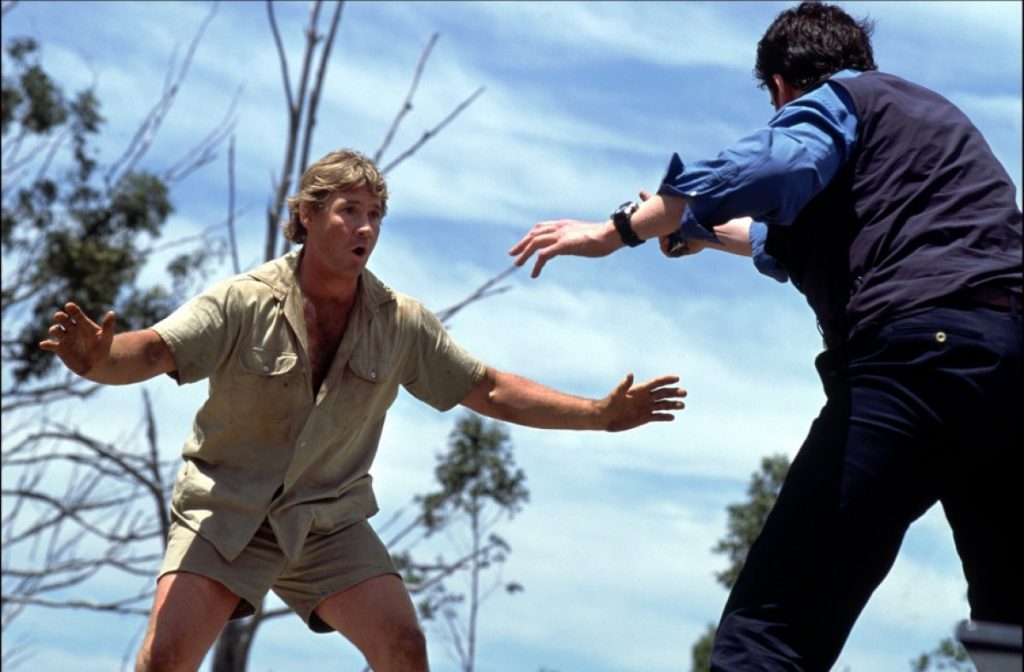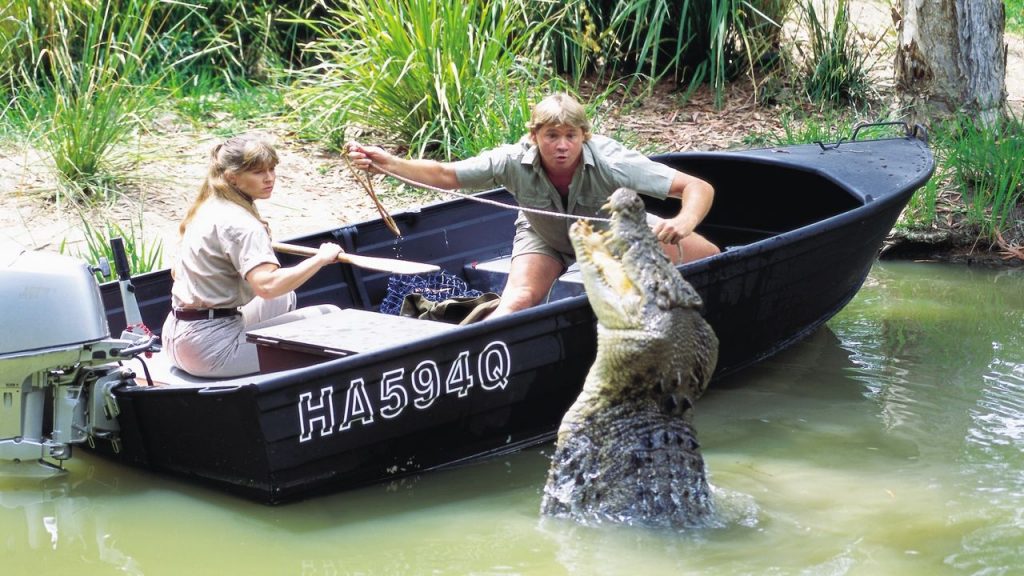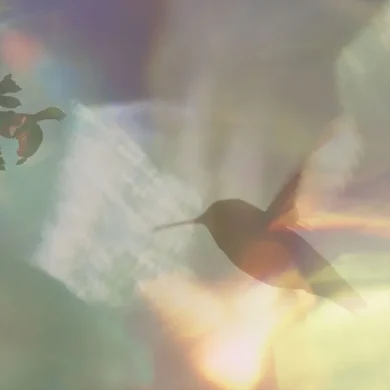Irwin was always an extremely physical performer, not afraid to throw his body into tackling crocs or dancing with venomous snakes, all the while narrating the animals actions, and providing context for why they’re pissed off. Sure, Irwin became a bit of a joke because of his aggravation towards animals that, by all suggestions, were just going about their own business (unless some kind of trickery was employed). Irwin’s genuine surprise when a snake would lash out at him was all part of the act. An act that was hilarious, yet, one that added to the reality that these were dangerous creatures, and that maybe, just maybe, Irwin was outclassed by natures deadliest. But, even though his presentation style was unique and comically absurd, there was always the deep feeling of respect that Irwin had for the creatures he manhandled. In one scene, Steve’s talking in the middle of the desert about a lizard he’s found, flies buzzing like mad around his head. In an off hand, yet purely respectful way, Steve comments, ‘not now flies, I don’t have the time’. Ever the diplomat.


The ethics of Steve’s actions aren’t brought into question in Collision Course, after all, this was a film built from the ground up around the Irwin’s, and with the assistance of their long time friends. There is a core pro-animal, conservation message that rings through loud and true, with Steve doing his best to try and engage viewers in real world issue of poachers. Sure, Szubanski’s farmer is played for over the top slapstick comedy, but her agenda is to kill a croc who is simply living in its own environment, doing its own thing. The exact thing that Steve and Terri are fighting against.
Steve’s career began from relocating problematic crocs – not to another location, as his main ‘narrative thread’ has him doing, but instead to his reptile park. As exuberant as Steve was, he had a deep conservation spirit that lead him to use his celebrity to buy up sections of land in Australia, with the hope of turning them into sanctuaries where animals could thrive, far away from the eyes of hunters. His preservation work extended to Australia’s neighbours, with the Irwin’s lending their helping hands in Asian countries to provide care for their wildlife. With that in mind, it’s obvious that Steve Irwin saw Collision Course as merely another way of amplifying his pro-animal conservation message. He cares little about the actual film side of things, and is more interested in utilising the venue of cinema to reach even more possible.
So, how do you build a film around a guy who spends the majority of the time excitedly talking to the camera as he cops it sweet with some critters?
Well, you take the cinematic elements of the personality of Steve Irwin and amplify the theatrics in every way possible. Basically, you turn Steve Irwin into a down under Buster Keaton.
Keaton’s work is one of balletic genius. He flows through a scene with ease, navigating dilemma after escalating dilemma like he’s made of liquid. While Steve Irwin’s physique is far from the elastic body of Buster Keaton, he still manages to employ a lot of the theatrics that made Keaton who he was. One sequence has Steve chasing a massive croc down a river, hanging from a speeding dinghy via a rope. Steve glides in the wake, occassionally submersing himself completely in the water to tackle the croc. The fight escalates to a point where the croc is cornered in a creek bed, with Irwin dancing with the snapping jaws to get a rope around and tie the giant beast up.
It’s an impressive sequence that shows the immense physical demands that ‘croc hunting’ takes on a man. After Terri and Steve have managed to fenangle the croc into submission, they fall back together in a post-coitus pose, exhausted. Later, when Terri and Steve find an orphaned joey in the pouch of its dead mother, Steve tells Terri to ‘whip her shirt off’ and keep it warm.
There’s a wonderful clarity of Terri and Steve’s relationship in Collision Course. What could have been a case to employ sexual innuendo, in fact turns out to be a way of showing two people who genuinely care about the environment and have moulded their relationship around this common interest. There’s an ease with the way the two communicate, always relaxed in the face of peril, always looking out for the other. If Steve was being positioned to be the ‘new Mick Dundee’, then the progressive, respectful way of Steve Irwin would have been a vast improvement over the womanising, misogynist that is Paul Hogan’s Dundee caricature.
In the climactic tussle between the Irwin’s and the CIA agents, Steve climbs out of the window of their speeding 4WD, leaving Terri behind the wheel. As he’s halfway out the passenger window he calls back, ‘remember, you’ve got a croc on board’. And, thanks to the caring nature of the Irwin’s, there’s also a venomous spider which they’d picked up on their travels to help create antivenin with, a Joey, a furious King Brown snake, and of course, that massive crocodile. As the tussle continues, Steve looks directly at the camera and announces that they’ve ‘found themselves in the middle of a poacher war’.
The CIA is unaware that the Irwin’s are merely trying to relocate the croc that has the MacGuffin in its guts, thinking that because of their global conservationist actions, they’re actually global, political terrorists. The case for making the Irwin’s a pair of ludicrous Bond villains is made with this genuinely hilarious suggestion. It’s one of the few moments of pure comic gold in the film.
As the threadbare plot rollicks along to its nonsensical conclusion, Steve manages to dispatch one of the CIA agents by waving the King Brown in his face. The agents tumbles off the 4WD, and Steve turns to the camera once again, ‘that’s one poacher that just learned a valuable Steve-O lesson – don’t muck with it’. It doesn’t make any sense, but it doesn’t need to, as Steve delivers the line with all the conviction of someone who believes every word they utter.
(In fact, it makes as much sense as when the fact that when the camera moves to a wide shot, we never see any of the cameras that Steve would be addressing, making this some kind of bizarre, fourth wall breaking experiment that goes so far as to suggest that maybe the TV series that made Steve famous was in his head all along.)
The legacy of Steve Irwin as a hyperactive conservationist lives on in this mishmash of narrative threads that end in one of the most insane, over the top final shots ever committed to film. After the Irwin’s have conquered the poachers-cum-CIA agents, they find that the crocodile has passed the data unit. Steve rants momentarily about people littering, about how the vistas of Australia are being filled with their waste, throwing the unit into the air as a swarm of army helicopters appear behind him. In a film full of bonkers moments (I hadn’t even mentioned the maniacal Jo Buckley, played by the extremely dedicated Kate Beahan, who steals a one person helicopter, chasing the Irwin’s down a river, all the while throwing dynamite out the window like she’s arrived straight out of a Looney Tunes cartoon), this final shot is one to applaud.
The combination of the Irwin’s adventure and the frenetic action of the CIA agents and Szubanski’s farmer, never properly gels together, instead feeling like the result of a meddling board room full of studio heads providing incoherent notes, demanding that an explosion needs to be inserted here, and a poop joke needs to be put in there, all to appease the four quadrants of film goers.
Look, The Crocodile Hunter: Collision Course is not a great film. It’s not really even that worthy of having had this many words written about it. But, there is a perennial charm that exuded from Steve Irwin that simply will never fade, even after over a decade since his death. The film was a box office flop, failing to engage both domestic and international markets, and there were no further Crocodile Hunter films. Sure, it made $33 million from a budget of $12 million, but that is not enough in the eyes of the bean pushers at the studios. One has to ask why they didn’t simply make a feature length episode of the TV series, or a documentary about the Irwin’s, but hey, it is what it is – a madcap film that feels like the perfect indication of what the Australian film industry was like in the early 2000’s. Grasping at anything that might create a widespread box office hit.
On paper, Steve Irwin was Mick Dundee brought to life. Yet, unlike Dundee, Steve was a more charming, accepting, open individual. His enthusiasm was infectious, with his goofy grin never failing to bring a smile to anyone’s face who witnessed it. His death felt inevitable – given the way he stirred up animals, it was a foretold fate that he’d fall to one of them. Nobody expected it to happen the way it did, but it’s how his life was claimed.
Nowadays, Steve’s legacy carries on with the work of Terri, and their kids Bindi and Bob, who have thrown the life into honouring their father and educating the world about conservation and how to care for the environment. They may not have as much blind enthusiasm and raw energy as their dad did, but Bindi and Bob have done a solid job of carrying forward his message. As discussions carry on about who will replace David Attenborough once he retires, maybe we don’t have to look too far, with the Irwin’s possibly rising to the task of honouring the legacy of two great enviro-warriors.
And given the way that films get belated sequels, maybe we can expect a Crocodile Hunters: Collusion Course sequel where Bindi and Bob somehow get involved with the 2020 Republican V Democrat American election, creating the illusion that maybe they are working with Russian (or, maybe even North Korean) forces to rig the election, when really, they’re just trying to save a moose.
Director: John Stainton
Cast: Steve Irwin, Terri Irwin, Magda Szubanski
Writer: Holly Goldberg Sloan




